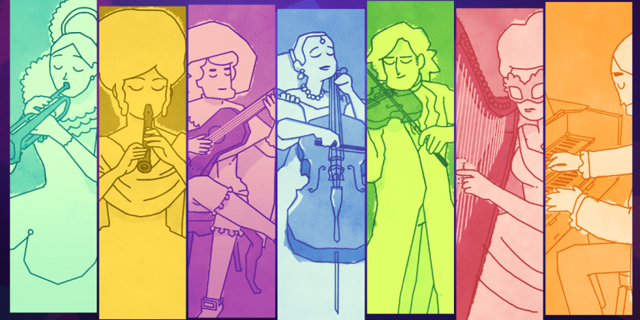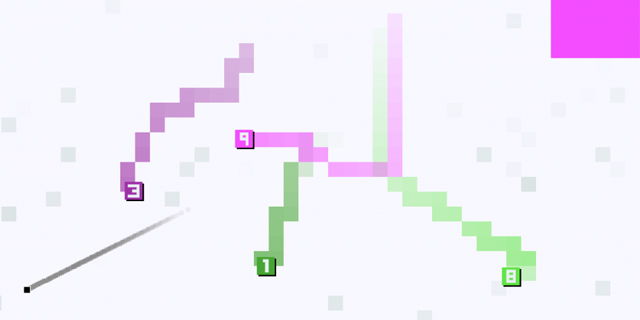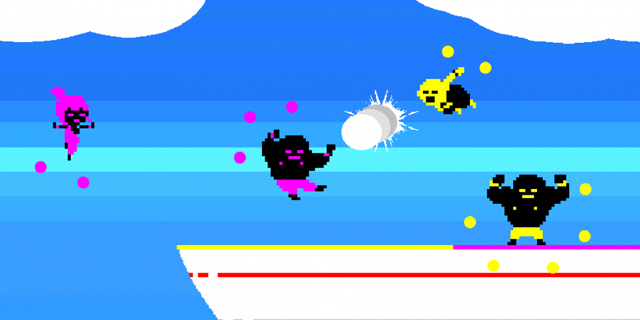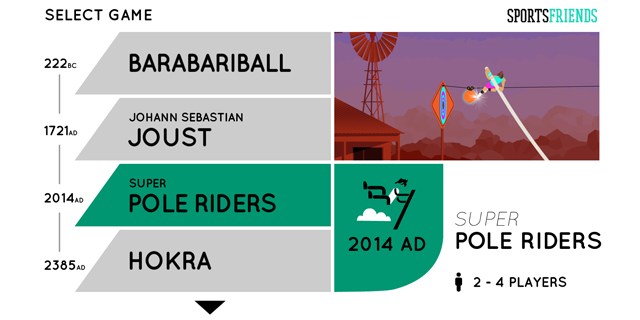
After years of industry-fueled hype and Kickstarter-fueled development, it’s finally finished and available to everyone: Sportsfriends, the four-game indie local multiplayer collection that takes the idea of “sports” and strips it down to its most vital components. And, well, it’s as great as people say it is.
The most prominent part of the collection is probably Douglas Wilson’s Johann Sebastian Joust. The game uses Move controllers (or, if you don’t have enough, DualShocks) as objects to protect, as you try to eliminate every other player by hitting theirs or otherwise causing them to move too much. The music speeds up and slows down, indicating higher or lower movement thresholds, and knowing when and how to make a move on your friends is key to victory.

Version differences
The PS3 version is actually superior to the PS4 version, since it supports seven controllers for Joust compared to the PS4’s maximum of four. They’re otherwise identical, though, and cross-buy is available. The PC/Mac/Linux version is on its way very soon, but development has been held up by Windows’ less-cooperative Bluetooth setup.
Ramiro Corbetta’s Hokra is probably the game that feels the most like a real sport, using goals and team passing tactics reminiscent of something like soccer. It’s a two-on-two title only (the other games support one-on-one), but it makes up for it by framing itself around that particular setup. The default court is probably the most consistently enjoyable, but there are lots of options for variety, and if that’s not enough for you, there’s a robust and easy-to-use court editor.
Super Pole Riders is from QWOP creator Bennett Foddy, and it shows: the control scheme is intentionally weird. It’s actually usable when you get used to it, thankfully: you control yourself with the left stick and your vaulting pole with the right one. There’s a ball on a string across the play area, and each team is trying to push that ball to its end and score points. You can use the pole to slowly drag it, or vault yourself up and kick it for way more power and distance. You’ll also have to watch out for opponents landing on you and eliminating you for a while.

While all the games are very friendly to new and casual players, Noah Sasso’s BaraBariBall has the most depth for people who really want to get into its mechanics. It’s a side-view platform game in the vein of Smash Bros., but your goal is to dunk a ball into the water on your half of the arena for two points and avoid dying yourself and losing a point every time. It’s heavily driven by multiple air jumps, which only recharge when you rest on a platform and leave you especially vulnerable if you run out.
Each of the games retains a signature aesthetic, ranging from BaraBariBall‘s primitive pixel art to Joust‘s elaborate glorified scoreboard, but significant work went into the interface that collects them all. It’s just as simple and streamlined as the games themselves, and it somehow manages to fit with each of the different titles. It also allows for a simple, consistent way to explain the game’s controls; even though they’re all very simple, it’s still great to have that there in the inevitable context of bringing in new players during a party.

What’s impressive is how much love clearly went into putting this package together. Lots of options and modes have been added to keep things interesting for repeat players, including a whole host of tweaks and secrets for Joust. Want one player “conducting” to control the music speed? Want to play in teams? Want to tweak sensitivity settings, or turn on a “sudden death” mode that narrows the safe window when players take too long? Go ahead. There are also two secret two-player games accessed through secret menu presses, and a checkbox simply labeled “no monkeys.”
The indie community’s support of local multiplayer is growing, and there are many impressive titles being made through that effort, but it is likely that Sportsfriends will long remain the community’s standard-bearer. Grab some other human beings and check this one out as soon as you can.
Pros: Four fun games, a polished framework to contain them
Cons: You are going to need to have friends to play



















